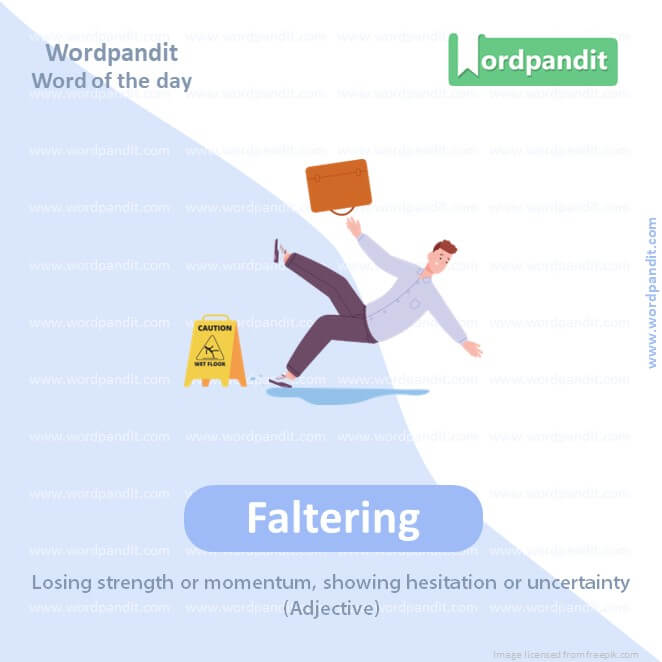Daily Vocabulary Words: Enhance Your Lexicon with Leading Newspapers & Publications
Welcome to the Daily Vocabulary section at Wordpandit!
Our mission is straightforward: to bring you essential vocabulary words featured in top newspapers and publications worldwide. By focusing on words you’ll encounter in renowned sources, we aim to help you enhance your vocabulary effectively and practically.
Our selection includes words from:
– The New York Times
– The Washington Post
– Scientific American
– BBC
– The Guardian
– Psychology Today
– Wall Street Journal
– The Economist
– The Hindu
– The Times of India
– The Economic Times
– Hindustan Times
– Live Mint
– The Indian Express
– And many more.
We are committed to your vocabulary development. Simply visit this section regularly and explore the daily posts. This is your go-to repository for commonly used words, providing significant practical benefits by familiarizing you with vocabulary from the leading publications listed above.
Make it a habit to visit our website daily and expand your lexicon with words from top newspapers and publications. (edited)

WORD-1: Pervasive
CONTEXT: It’s still far more pervasive than white Americans can easily appreciate.
SOURCE: Washington Post
EXPLANATORY PARAGRAPH: Pervasive is like when the smell of cookies baking fills the whole house. It means something is everywhere and spreads all around.
MEANING: Existing in every part of something or being spread throughout (Adjective)
PRONUNCIATION: pur-VAY-siv
SYNONYMS: widespread, common, prevalent, ubiquitous, omnipresent, extensive, universal
USAGE EXAMPLES:
1. The pervasive smell of flowers filled the garden.
2. Technology has become pervasive in our daily lives.
3. The pervasive fear of heights kept him from climbing the ladder.
4. Noise pollution is pervasive in the city.

WORD-2: Unionization
CONTEXT: Unions won some victories, and fear of unionization may have pushed some employers to increase pay.
SOURCE: New York Times
EXPLANATORY PARAGRAPH: Unionization is like when all your friends get together to form a club where you can decide things together. It means workers coming together to form a group to protect their rights.
MEANING: The process of organizing workers into a union, a group that works together to achieve common goals (Noun)
PRONUNCIATION: yoo-nee-uh-nuh-ZAY-shun
SYNONYMS: organization, formation, grouping, association, coalition, federation, collaboration
USAGE EXAMPLES:
1. The employees are working towards unionization to improve their working conditions.
2. Unionization helped the workers negotiate better wages.
3. The company faced challenges due to the unionization of its staff.
4. Unionization can provide workers with a stronger collective voice.
WORD-3: Gratuitous
CONTEXT: A gratuitous recession could all too easily undo much of the progress we’ve made.
SOURCE: New York Times
EXPLANATORY PARAGRAPH: Gratuitous is like when someone gives you extra candy even though you already have enough. It means something extra that isn’t really needed.
MEANING: Unnecessary or uncalled for; done without good reason (adjective).
PRONUNCIATION: gruh-TOO-ih-tus
SYNONYMS: unnecessary, unwarranted, needless, superfluous, uncalled-for, excessive, redundant
USAGE EXAMPLES:
1. The movie had a lot of gratuitous violence.
2. His comment was gratuitous and didn’t add anything to the conversation.
3. They provided gratuitous advice that wasn’t really helpful.
4. The gratuitous decorations made the room feel cluttered.
WORD-4: Caucusgoers
CONTEXT: In honor of the freezing temperatures that caucusgoers are expected to brave.
SOURCE: New York Times
EXPLANATORY PARAGRAPH: Caucusgoers are like a group of people who come together to decide who they think should be the leader. It means people who attend a meeting to choose a candidate for an election.
MEANING: People who attend a caucus, which is a meeting to choose candidates or decide policies (noun).
PRONUNCIATION: KAW-kus-go-erz
SYNONYMS: voters, delegates, participants, members, constituents, attendees, electors
USAGE EXAMPLES:
1. The caucusgoers gathered to discuss the upcoming election.
2. Many caucusgoers supported the new candidate.
3. The opinions of the caucusgoers influenced the party’s decision.
4. Caucusgoers play an important role in the democratic process.

WORD-5: Faltering
CONTEXT: If Republicans get to autumn and Trump is their nominee and faltering badly, you will probably see some rose-colored glasses, “aah, if only we had nominated DeSantis instead, we should have given him a chance” wish casting emerging.
SOURCE: New York Times
EXPLANATORY PARAGRAPH: Faltering is like when you try to ride your bike for the first time and you wobble a bit. It means to lose strength or confidence and start to make mistakes.
MEANING: Losing strength or momentum, showing hesitation or uncertainty (Adjective)
PRONUNCIATION: FAWL-ter-ing
SYNONYMS: hesitating, wavering, stumbling, struggling, weakening, stuttering, floundering
USAGE EXAMPLES:
1. His voice was faltering as he gave his speech.
2. The business is faltering due to poor management.
3. She kept faltering during her piano recital.
4. His confidence was faltering after the difficult test.

WORD-6: Penchant
CONTEXT: Trump has an unbelievable number of negatives going against him, from people’s potent memories of Jan. 6 to his own penchant for disaster and the fact that it will be very challenging for him to stick to the “Mr. Stable Genius” message for long.
SOURCE: New York Times
EXPLANATORY PARAGRAPH: Penchant is like when you really, really like drawing and do it every day. It means having a strong liking or preference for something.
MEANING: A strong liking or preference for something (noun)
PRONUNCIATION: PEN-chunt
SYNONYMS: liking, fondness, preference, inclination, tendency, attraction, propensity
USAGE EXAMPLES:
1. He has a penchant for collecting rare coins.
2. Her penchant for reading keeps her busy.
3. They have a penchant for adventure and travel.
4. His penchant for spicy food is well-known among his friends.
WORD-7: Propensity
CONTEXT: The thing to keep in mind about Trump is that he does scramble electoral math a little by drawing in the sort of low-propensity voter who has otherwise eluded Republicans.
SOURCE: New York Times
EXPLANATORY PARAGRAPH: Propensity is like when you often choose to play with building blocks because you like making things. It means having a natural tendency to do something.
MEANING: A natural tendency to behave in a particular way (noun).
PRONUNCIATION: pruh-PEN-si-tee
SYNONYMS: tendency, inclination, predisposition, proclivity, habit, bias, leaning
USAGE EXAMPLES:
1. She has a propensity to talk too much when she’s nervous.
2. His propensity for forgetting things got him into trouble.
3. They have a propensity for helping those in need.
4. His propensity for working late often affects his social life.

WORD-8: Intensified
CONTEXT: He has intensified his multiyear campaign to undermine the rule of law and the democratic process.
SOURCE: New York Times
EXPLANATORY PARAGRAPH: Intensified is like when you make the music louder and louder until it’s really loud. It means to make something stronger or more intense.
MEANING: Made more intense, stronger, or more serious (Verb)
PRONUNCIATION: in-TEN-suh-fide
SYNONYMS: heightened, increased, amplified, strengthened, deepened, escalated, enhanced
USAGE EXAMPLES:
1. The storm intensified as it moved closer to land.
2. His feelings for her intensified over time.
3. The conflict intensified after the new policy was announced.
4. Their efforts to finish the project intensified as the deadline approached.
WORD-9: Ascendancy
CONTEXT: A lawmaker who voted to certify the 2020 election results, to ensure the ascendancy of Mike Johnson, a loyalist who was an architect of the attempt to overturn that election.
SOURCE: New York Times
EXPLANATORY PARAGRAPH: Ascendancy is like when you are winning a game and have the upper hand. It means having power or influence over others.
MEANING: A position of power or influence over others (noun).
PRONUNCIATION: uh-SEN-dun-see
SYNONYMS: dominance, control, power, authority, supremacy, influence, leadership
USAGE EXAMPLES:
1. The company’s ascendancy in the market is clear.
2. His ascendancy in the group made him the leader.
3. The political party gained ascendancy after the election.
4. Their technological ascendancy gave them an edge over competitors.
WORD-10: Conceding
CONTEXT: The burden of conceding because the integrity of the process is ultimately more important than the identity of the president.
SOURCE: New York Times
EXPLANATORY PARAGRAPH: Conceding is like when you play a game with your friend and say, “You win!” It means to admit that someone else is right or has won.
MEANING: Admitting that something is true or valid after first denying or resisting it; surrendering or yielding (verb).
PRONUNCIATION: kuhn-SEED-ing
SYNONYMS: admitting, yielding, surrendering, acknowledging, granting, accepting, giving in
USAGE EXAMPLES:
1. After a long debate, she ended up conceding his point.
2. He is conceding defeat after the final round.
3. The politician is conceding to his opponent in the election.
4. She is conceding that she made a mistake.
Vocabulary SSC
Navigating the path to success in competitive examinations like the Staff Selection Commission (SSC) triggers a keen focus on ‘vocabulary SSC’. This collection of words, often prominent in SSC examinations, holds paramount importance, and forms a significant part of a candidate’s linguistic preparation. However, mastering ‘vocabulary SSC’ is a process that requires deliberate strategy and dedication.
To begin the journey with ‘vocabulary SSC’, a structured learning regime is key. Break the learning process into manageable chunks. Concentrate on a set number of words each day. This steady, consistent approach reduces the risk of burnout and enhances long-term retention of vocabulary.
The strategic use of memory aids can significantly boost the learning of ‘vocabulary SSC’. Utilize flashcards, memory apps, or even create personal mnemonics to help remember each word and its meaning more effectively. Associating a word to a personal event or object creates a lasting mental connection, making recall easier.
To truly master ‘vocabulary SSC’, it’s crucial to engage with the words in different contexts. Incorporating the words into daily reading and writing practices provides exposure to their usage in varied situations. This practical application reinforces the understanding of ‘vocabulary SSC’, enhancing the ability to employ these words accurately in the exam setting.
Regular revision is a must when preparing ‘vocabulary SSC’. Spaced repetition, interspersing the study with regular breaks, and regularly revisiting the words learned, ensures the words stay firm in your memory, ready to use when needed.
In essence, preparing ‘vocabulary SSC’ is an exercise in action-oriented constant learning. Strategic use of learning tools, practical application, and regular revision are key aspects of getting a grip on ‘vocabulary SSC’. As you stride through this process, you inch closer to acing your SSC examinations with an enriched vocabulary and boosted confidence.













